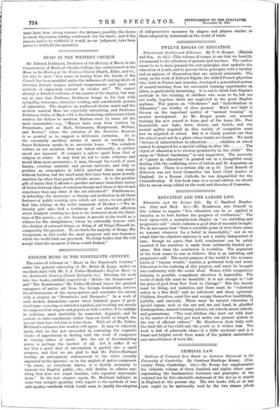EDUCATION AND THE LARGER LIFE.
Education and the Larger Life. By C. Hanford Hender- son. (Gay and Bird. 6s.)—Mr. Henderson sets himself in this volume to inquire " how education can be so applied in America as to best further the progress of civilisation." The book opens with a metaphysical chapter on " an unfolding and progressive self " which contains a good deal of unsound thought. We do not agree that "from a scientific point of view there seems no warrant whatever for a belief in immortality," nor do we admit that the objective universe is not a reality independent of man : though we agree that both conclusions can be safely asserted if the assertion is made from arbitrarily limited pre- mises. But then the conclusion is worthless. The argument of the book seems to run as follows Man is an unfolding and progressive self. The social purpose of the world is the accumu- lation of "human wealth," namely, a perfected body and mind. Education is the realising of this purpose, and must be brought into conformity with the social ideal. Hence, while compulsory training is possible, compulsory education is impossible. The world of daily life must be beautiful : it is not enough to "call the price of pork from New York to Chicago." But the beauty must be living, not imitative, and there must be "voluntary action in a free field," and no self-deceit and sham optimism. Children, therefore, must live and occupy themselves healthfully, joyfully, and sincerely. There must be natural education of special organs, such as the eye and ear and hand, in glorified kindergartens, manual training schools, art schools, music schools, and gymnasiums. "The very children who start out with least in the matter of heredity get least under our present system in the way of efficient culture." Mr. Henderson deals fully with the ideal life of the child and the youth as it strikes him. The book is full of admirable ideas—if a little mystical—and is a frank and helpful revolt from much of the painful materialism and unhealthiness of town life.






















































 Previous page
Previous page